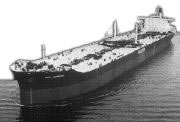IF YOU LIKED the logic by which the Supreme Court blocked the Florida recount and selected Bush as president, you’ll love the decision by a federal judge in Seattle allowing a major oil-port expansion in Washington’s supposedly protected inland waters. It’s a decision UW law professor William Rogers calls “so bad” that he’s made it a cautionary example in his course on environmental law. And if the decision stands, it will blow a hole in the hallowed Magnuson Amendment big enough to drive an oil tanker through. Or many oil tankers.
That 1977 amendment to the Marine Mammal Protection Act is one of the last and most celebrated legacies of the late Sen. Warren G. Magnuson, Washington’s longtime legislative powerhouse in Washington, D.C. It forbids the construction or alteration of any Puget Sound dock or other shoreside facility that “may result in any increase in the volume of crude oil capable of being handled at any such facility” for export outside the state. This simple, sweeping language has kept out the supertankers and saved our inland sea from becoming a giant oil terminal.
Until now. In 1996, the Army Corps of Engineers, which oversees navigable waterways, granted ARCO (now BP) a permit to expand the pier serving its Cherry Point oil refinery, doubling the number of tankers it can berth. The Corps did not require an environmental impact statement (EIS). Five green groups and one commercial fisherman sued, arguing that this expansion threatened the marine environment and violated the Magnuson Amendment. ARCO went ahead and built most of the dock extension.
U.S. District Judge Robert Lasnik heard the case last Sept. 20, just as war fever and Middle East anxiety were building around the country. Maybe it wasn’t the best time to be arguing against a project that could bring more American oil in from Alaska. At any rate, Judge Lasnik was not impressed with the plaintiffs’ arguments. In October, he rendered the verdict that’s given Rogers such fine classroom fodder and marine advocates much alarm. In a virtuosic display of textual hairsplitting, he found that the new dock wing does not violate the amendment because it’s intended to handle “petroleum product” rather than crude oil, and the amendment only mentions crude oil. Never mind that it would free up capacity to unload more crude on the original dock.
Even more Jesuitically, Lasnik found that even if the expansion dramatically increases the volume of crude oil coming in, it wouldn’t increase the dock’s “capacity,” which is what the Magnuson Amendment addresses. This is because the dock’s pipes can move much more oil than they’re currently receiving—five times as much, 1.2 million barrels a day. The limiting factor has been dock space, not pipe “capacity.” And Lasnik ruled that dock space and tanker volume don’t count: ARCO/BP can legally quintuple the amount of oil it ships to Cherry Point and not violate a law whose stated purpose is “to restrict such tanker traffic in Puget Sound.”
“This is ridiculous,” snorts Rogers. “The Magnuson Amendment is supposed to limit oil transport. This is a bad decision with bad policy behind it.” Rogers faults not only the feds for approving the dock but Washington state for not blocking or limiting it on environmental grounds: “The state should have exercised its veto power under the Clean Water Act.”
But Lasnik upheld the Corps’ finding that the new 950-foot dock wing would not have significant environmental impact and did not require an EIS. He declared that it doesn’t matter whether tanker traffic increases because the stated “purpose of the dock extension is to deal with existing traffic.” And, he affirms, the project would have only “negligible or low impact” on any species listed as threatened or endangered.
There is the issue, however, of a little fish, the Pacific herring, that’s not listed (yet) but is the keystone species and essential food for the whole marine habitat—from seabirds, salmon, and bottom fish to orcas. Cherry Point, including the dock site, is the breeding ground for a distinct herring population that was the largest run in greater Puget Sound but has declined disastrously since the 1970s—by more than 90 percent. Then, Cherry Point supported a thriving fishery; now biologists doubt the population can survive. Conservationists fear that shipping disrupts breeding and warn that a spill near Cherry Point would be catastrophic. They’ll propose that the herring be listed as endangered.
Judge Lasnik dismisses the issue in one sentence: “As for the Pacific herring, it is not listed as threatened or endangered.” Rogers thinks Lasnik missed the boat: The herring still “deserve special attention” under national environmental law—which the Corps eschewed when it avoided doing an EIS.
“I can’t believe the case will stand up under appeal,” adds Rogers. “I hope the attorneys will do a close historical reading of the Magnuson [Amendment] and its intent.” The appeal is pending before the 9th Circuit Court.
Eric Scigliano’s environment column appears every other week.








